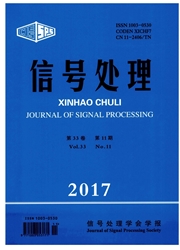

 中文摘要:
中文摘要:
压缩感知理论依据信号的稀疏性质进行压缩测量,将信号的获取方式从对信号的采样上升为对信息的感知,是信号处理领域的一场革命。本文提出一种基于非确定基字典(Uncertainty Basis Dictionary,UBD)对语音信号进行稀疏表示的方法,将压缩感知理论应用于对语音信号稀疏表示的压缩,并提出了基于求解线性规划问题的方法重构语音信号的算法。通过语音识别、话者识别和情感识别实验,从面向内容分析的角度,研究这种基于压缩感知理论的信息感知方法是否保留了语音信号的主要内容。实验结果表明,语音识别、话者识别和情感识别的准确率,与目前这些领域研究方法得到的结果基本一致,说明基于压缩感知理论的信息感知方法能够很好地获取语音信号的语义、话者和情感方面的信息。
 英文摘要:
英文摘要:
Compressive sensing theory compress measurements using sparsity of signal,changes the method of signal obtaining from signal sampling to information sensing,and is a revolution of signal processing.The speech signal is sparse represented based on Uncertainty Basis Dictionary proposed in this paper,the sparse representation of speech signal is compressed by compressive sensing theory,and proposes an speech signal reconstruction algorithm based on the method of solving linear programming problem.Through the experiments of audio,speaker and emotion recognition,we research that this information sensing method based on compressive sensing theory weather preserves the main content from the angle of content-based analysis.Experiment results show that the precision of audio,speaker and emotion recognition is general the same with methods in these research domain,and proves that it can acquire the audio,speaker and emotion information of speech signal using the information sensing method based on compressive sensing theory.
 同期刊论文项目
同期刊论文项目
 同项目期刊论文
同项目期刊论文
 An improved ART2 neural network: Resisting pattern drifting through generalized similarity and confi
An improved ART2 neural network: Resisting pattern drifting through generalized similarity and confi 期刊信息
期刊信息
